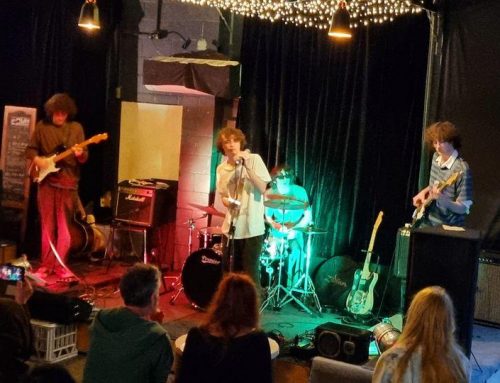Your humble editor recently bailed up Craig Claxton at his work to talk about a few things. Craig has a long history in the Brisbane music scene, and a longtime supporter of BASEQ.
Craig’s website is perhaps a good place to start get a better understanding of him. https://www.craigclaxton.com/
This post is one of two.

I want to start by covering off the last couple of albums and future recording plans. There’s a rumour that you’re just about to go back into the studio.
Recording. Yeah, I’m about to. It’s been put on hold mainly because I like the crew that I’ve been working with – the band. A couple of them have been overseas for three or four months and have just got back, so this will be our first gig in a few months [ at the Royal Mail Hotel, Goodna, as the BASEQ Jam host band 30 June, 2024], but I’m very much looking forward to it, as they are. They’re great players, they’re in demand. What can I say? You know, the good players always are so.
For the new recording, the songs are already written. We just need to get ourselves back together as a band. They are professional musicians and busy, but with our past, it will be like putting on a well fitted glove. It won’t take us long to get back up to speed.
For the BASEQ blues jam, we’re going to do maybe four or five original songs off the records, and then we’ll embellish with all the stuff that I used to do with The Mercurys, that I used to do with Mick Hadley. There’ll be stuff people will recognise, as well as some of the stuff that’s close to our hearts. We love playing that stuff as well, you know.
So the last two albums you did, you used Michael Fix for the recordings.
Well, we went to Airlock [Studios at Camp Mountain] where we tracked – that’s Ian Haug’s studio [Powderfinger lead guitarist, currently playing with Steve Kilbey and The Church] out past Samford. Because it’s got plenty of room with isolation booths for amps so we can play live, but you don’t have to worry about bleeding of the sound into other instrument microphones. [Airlock Studios: https://www.airlockstudios.com]
Michael Fix has a much smaller studio which is more for overdubs or, you know, small acoustic type things, as well as post production, like mixing. It’s well set up pretty much for what he does – he’s a phenomenon with Pro Tools. 25 years ago he got in on the ground floor with “recording in the box” and he’s so fast with it. [Michael Fix: https://michaelfix.com/studio]

So we just used the House engineer out at Airlock. Michael did come out to Airlock just observe what we were doing, to listen and get a feel for the projects. It wasn’t done in a desperate rush. It wasn’t like a Steely Dan album – it didn’t take a year. We spent about six days all up, by the time we put the brass sections on and the backing vocals and maybe I think, you know, some of the solos were done live. Some were overdubbed, starting out at Michael’s place.
Some of the solo’s had a couple of takes, but Michael was always very happy [with what was being recorded], he’s just a delight to work with. A very, very good guitar player in his own right, great guy to get along with, and very musical.
So that process that was for lies and alibis, your last album, and the previous Azure Blue? And does it help that Michael is an excellent guitarist in his own right, share a similar language?
That process was for both, 100%, yeah. He’s really comfortable to work with and we see eye to eye on a lot of things.
Style wise, Michael has a foot slightly more into the country camp. Yeah, his solo style, which some refer to as the “Tommy Emmanuel style” but really, it’s the Chet Atkins style … he always amazes me. It’s not been a style I’m particularly interested in playing myself but I do appreciate the genre, and his playing. When I hear him do it, I love it. He’s a little bit like that with me and my style of playing, he tells me.

Michael’s got a great set of ears. He always pulls good sounds and he doesn’t muck around. You know. If anything, he his eye on the clock, tried to do it as efficiently as possible. I wish he’d just sometimes slow down a bit, experiment, go “Hey, why don’t we try a few more things, see if anything interesting falls out”, but we’ll do that in the next album if need be. However, the next album I’m talking about doing is probably a bit more of a bluesy album. Not necessarily old school blues, but more straight ahead than some of the previous stuff we’ve recorded. However, I just I’m writing songs that I like to listen to.
The last two albums, Lies and Alibis and before that Azure Blue, especially struck me as a lot of the blues part of it was very intelligent, brought in R&B, with some interesting ideas thrown around with chord progressions, melody, arrangements – never stale, so it was always refreshing to listen to.
Thanks, mate. Yeah, yeah. Well, I try to make it stuff that is going to stand up to repeated listening’s and there’s going to be a bit more than you hear. Personally, I like albums like that. I’m quietly happy with both of them and I just want to do some more.

So where do these songs songs come from?
Well, I guess every songwriter would be lying if they didn’t say there’s an element of autobiography in there, but they’re not autobiographical, you know, they’re made-up stories basically, and I try to say something with the lyrics. The lyrics are probably the hardest part. I can come up with chord progressions and riffs and musical hooks until the cows come home, but writing a meaningful lyric? It’s not that easy.
I started collaborating with my wife, Caroline Hammond [https://carolinehammond.com.au/], who’s a wonderful lyricist, and she’s more on the second album, Lies and Alibis. She’s written two or three tracks with me on that. We’ve also collaborated for her new album, which is currently in the works. So, just from life experience and what I would like to listen back to and, preferably, not cringe.
Does it come from a catch phrase or some? A few words that sparks the inspiration?
It can do, not always, but can do. If I hear something that I think “that sounds like I could use it” or it could be in a song, or it could be a theme for a song. I’ll definitely put that in the notes app on my phone which has got thousands of these little ideas that you eventually go back and weed through, thinking “well, that’s terrible!” … but then there’s lots of little gems in there that you just go, “Oh yeah. I can use that”. But yeah, it’s like anything in life: if you want to be good at something, I think you have to work at it.
Is there any half songs where you’ve, you know that it needs another verse, for example, but it’s been like that for a couple of years now?
Yep, all the time. I’ll say to Caroline “can you look at this” and, you know, almost without fail she would come up with something and go, “what about this?” “Ohh yeah, that’s great!”, says I.
Caroline tells me it’s much easier to write songs in collaboration with me because she’s not emotionally connected and invested in it like she would be with her own stuff. The opening song on Lies and Alibis, “Money Back”, I had that chord progression going and I had a chorus, but I was not really happy with the lyrics I’d written for the verses. Caroline says “Here try this” and handed me a set of lyrics that she’d already written completely – it just fitted beautifully.
Like “Wine and Cigarettes”, which is a ballad on that album, same deal. I told her the story I had in mind. I had this chord progression that I’ve been playing over and over and I was quite happy with it. It felt like 5 minutes – it probably was 10 – in which she went “here try this”. That’s fantastic. She’s a real wordsmith and I’m in in awe of her abilities to do that. If it was just got a really basic blues themes, you know, I can do them until the cows come home. But I don’t want to do that. That’s actually been done a lot, you know, that’s been done, probably. A lot better. So I’m just trying to do something which is just me, with a bit of help from Caroline.
I’ve always liked a bit of air in my music. I don’t like it when it’s just a wall of noise or a wall of guitars. I like it to get stuff happening all over the place and. It just keeps it interesting for multiple listening’s.
I’ve heard things from other people, which I love. It’s interesting. I’ve got into vinyl recently and pulling out some of the old records, there’s a handful that I still love to death and just would play them over and over. But there’s a couple, I thought. “Yeah. Interesting. Hmmm”. In other words, it’s not quite doing it for me, the way it did when I was 16. But some others – I’ve got a copy from 1970 of Man Dogs and Englishman [ Joe Cocker]. I just love that record. It’s just “What a band” and “what great performances” and all that, even though it crackles like crazy because it got flogged through many parties and you know, years of batching and whatever. And I’ve only recently, like in the last six months, got back into vinyl records – it’s been a a fun thing to do because it just sounds better. It just … sounds … better. It really does. You can’t argue.





